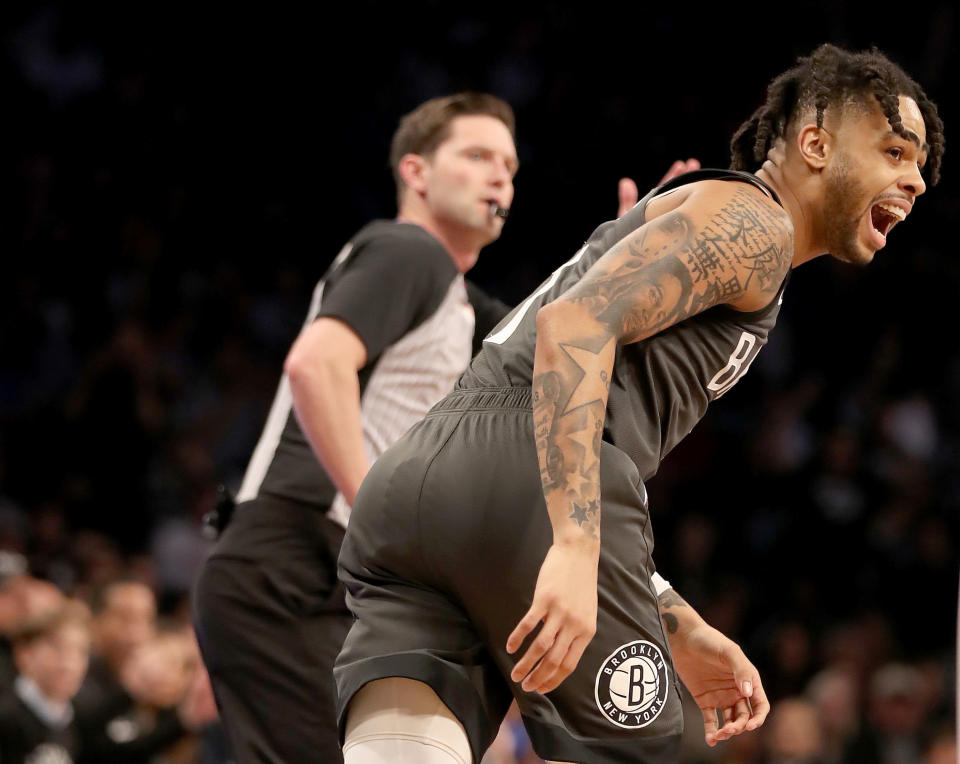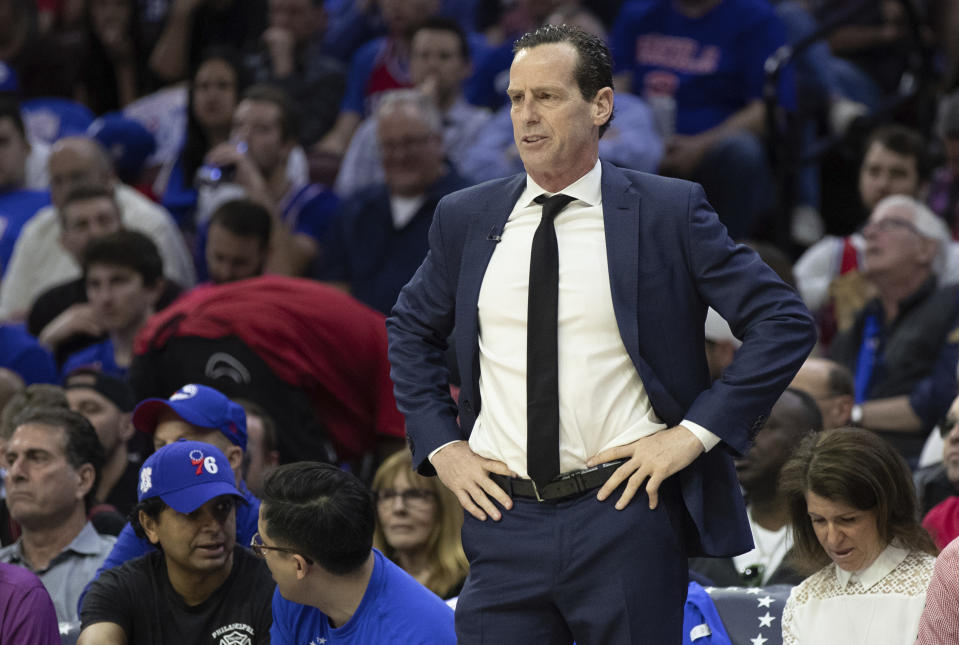Why the Nets' playoff run could be a launching point for free agency
Wrapped inside a well-cut suit with slicked-back hair, Brooklyn Nets coach Kenny Atkinson struts around like a Bond villain on the sidelines of the Barclays Center — Pat Riley, circa-1986 with a CrossFit membership. But at practice one early April afternoon, he looked more like a city dweller taking his dog for a walk in Crown Heights: ruffled hair, gray and white stubble poking out of his jawline, his deep-set eyes on the verge of caving in.
“I’m so single-minded, so focused on the task at hand,” he told the media afterward, reflecting on his tenure after he and his coaching staff agreed to contract extensions. "I’ve eliminated a lot of the distractions in my life, quite honestly. Somewhat of a sacrifice, with friends, even family at times. I think that’s the way you have to do this job. You’re really in a vacuum.”
With seven assistants, Atkinson oversees the NBA’s largest coaching staff. “The collaborative process is everything to me,” he said. “I joke all the time: I’m an information coach. I just kinda grab information from all the departments — analytics, performance, assistant coaches, video room. I’m not sure 10 years ago coaches had the support staff like I do. It’s a big staff. I need every one of them.”
In the uber-optimized, post-Moneyball NBA, where every movement is seemingly tracked and analyzed, what Atkinson said shouldn’t sound novel. But more information means more work, and even at the top rung of one of the world’s most competitive industries, elbow grease varies. Former Lakers president Magic Johnson — who traded current Nets star D’Angelo Russell and questioned his leadership abilities afterward — implied as much when he resigned from his position two weeks ago.
“I think they appreciate what really matters here,” said Russell when asked about the difference between the two teams. “What really matters and what makes the engine go, they appreciate it and they feed it, versus anything that’s gonna be a loose screw or affect the engine from going. They don’t take part in entertaining.”

So less drama. “I just think some people love that,” veteran forward Jared Dudley said. “Some people want to play for the Lakers or the Knicks. They grew up like that. Some people don’t want that pressure. So I think it’s 50-50.”
Consistent incremental improvement eked the Nets into the playoffs. Rookies, stars and journeymen have walked through the sixth-floor practice facility tucked away in Industry City and come out better for it. But down 3-1 against the star-spangled Philadelphia 76ers, they find themselves in the upper limits of functionality. Talent wins out. Fortunately for the Nets, they are armed with the cap space to attract two max-level free agents this summer, and an attractive pitch for the star who is drawn to big markets but turned off by the beast that fuels the mystique.
--------
When Russell, the No. 2 overall pick in 2015, was traded to Brooklyn, he pulled Atkinson aside to have the conversation that would anchor them, a sort of Polaris through the turmoil of progress. Russell echoed the message his father, brother and college coach, Thad Matta, had given Atkinson: coach him hard. “I wanted to be coached,” Russell said. “I wanted to be guided through everything.”
The Nets didn’t practice hard that afternoon in April after dropping a game to the Milwaukee Bucks, offering a window of hope to the trailing Miami Heat in a paper-thin playoff race. But the coaching staff cut together two different film sessions, one on future tactics, the other on the past night’s horrors, a lowlight reel that featured Russell prominently.
“He just stands up and he’s accepts the coaching,” Atkinson said. “I learned that from [Mike Budenholzer] in Atlanta, and you know how [Gregg Popovich] does it: When you coach your best player really hard, it changes everything. It makes it easier to coach the whole team.”
Discussing Russell’s attitude makes Atkinson both giddy and curious. “What’s amazing about him is his innate confidence,” he continued. “I don’t have it. I don’t know what it is. You see it. It’s so hard to get your finger on it. There’s just not a lot of guys like that. It’s not bravado, it’s not cockiness. It’s more like a natural confidence that’s just … I don’t know, it’s in his DNA. You’re born with it or you’re not.”
In Brooklyn, Russell has epitomized the key difference between ego and confidence: the willingness to be criticized.
Atkinson discovered early on that Russell, a combo guard to that point, had the vision to play point guard full time. “You have to make that statement,” Atkinson said. “You are a point guard. I really think that’s who he is. He’s a leader and a point guard.” The rest was fine-tuning.
Russell, for his part, bought in to the rigors of the plan, to a summer spent in the practice facility in Brooklyn and a sea change when it came to pregame routine and diet — and a front-row seat on the bench during crunch time. Russell says he never asked why he was sitting. He just consumed the game, watching Brooklyn’s steadier hands, Spencer Dinwiddie and Caris LeVert, before a devastating leg injury derailed LeVert’s ascent, giving Atkinson no choice but to give Russell the rope.
After a few weeks of countless high-arcing floaters that hung at the front of the rim before tilting out and passes that flung from one end of the court to the other, Russell weaved it into a seven-game winning streak that sprung Brooklyn into the playoff race and gave the guard his first All-Star berth.
So it is that Russell, a restricted free agent this summer, is the pitchman and the target, offering the promise of an experiment he may or may not see out: buy in, and look what the system can do for you.

--------
In just over 60 minutes of floortime in Brooklyn’s first-round series against the 76ers, Jared Dudley became the bane of Philadelphia. Despite giving up six inches and 25 pudgy pounds to Joel Embiid, Dudley gave the hobbled All-NBA big man fits in Game 1. Dudley sat out Game 2 with a gnawing calf injury, then called Ben Simmons an average player in the halfcourt prior to Game 3, before taking the court and jawing with Jimmy Butler in Game 4, resulting in ejections for both.
None of this would be remarkable but for the fact that few would have pegged Dudley as a rotation player anywhere this season, let alone a productive playoff contributor. In fact, he even had multiple DNP’s throughout the course of this season.
But riding pine in Brooklyn doesn’t mean clocking out at 4:59 p.m. Nets players wear heart-rate monitors in practice, and a low in-game load means a high in-practice mode. “They know if you’re BS’ing a workout,” Dudley said. “They know if you need to get a certain amount [of work]. Everything is so calculated scientifically.” Five of their assistant coaches played professionally, either in the NBA or abroad, and they play floor-scrapping, five-on-five sessions to replicate in-game intensity for the players who don’t see enough real action.
The staff identified that Dudley, a 12-year vet who has shot 39 percent from deep for his career, could improve his range. So at 33 years old, he practiced new moves, mastering the pump-fake and side-step dribble, a Danny Green staple that gives Dudley extra breathing space. On drives, opponents were anticipating he would dump the ball off to big men, so now he’s taking a few more floaters to keep the defense honest.
The Nets’ famed development staff didn’t just help Russell become a star. Joe Harris, once a journeyman teetering out of the league, is now the 3-point contest champion. Dinwiddie, a second-round pick, just inked a $34 million extension. The 76ers’ own star free agents, Butler and Tobias Harris, have seen it first-hand in their playoff series against Brooklyn.
After Game 4, Embiid called Dudley “a nobody.” If a nobody can make a postseason impact for the Nets, imagine what a star could do.
More from Yahoo Sports:

